湖北省大冶市第一中学2019-2020学年高二下学期期中考试(5月月考)英语试题 Word版含答案
湖北省黄石市大冶一中2020年秋季高二英语期中考试试卷(无附听力材料)
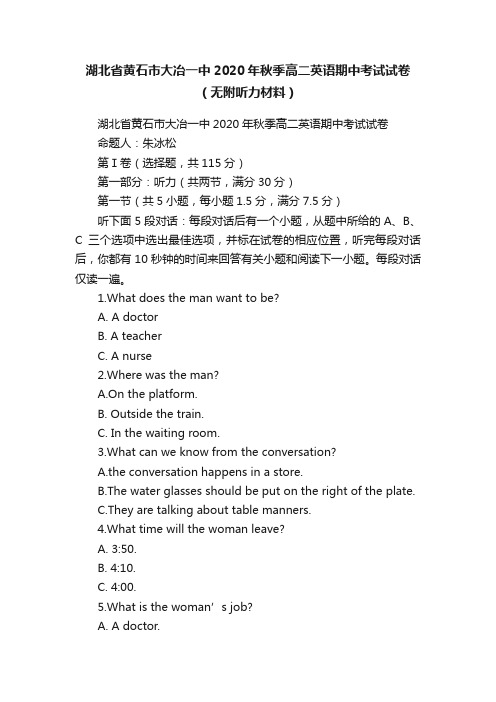
湖北省黄石市大冶一中2020年秋季高二英语期中考试试卷(无附听力材料)湖北省黄石市大冶一中2020年秋季高二英语期中考试试卷命题人:朱冰松第Ⅰ卷(选择题,共115分)第一部分:听力(共两节,满分30分)第一节(共5小题,每小题1.5分,满分7.5分)听下面5段对话:每段对话后有一个小题,从题中所给的A、B、C三个选项中选出最佳选项,并标在试卷的相应位置,听完每段对话后,你都有10秒钟的时间来回答有关小题和阅读下一小题。
每段对话仅读一遍。
1.What does the man want to be?A. A doctorB. A teacherC. A nurse2.Where was the man?A.On the platform.B. Outside the train.C. In the waiting room.3.What can we know from the conversation?A.the conversation happens in a store.B.The water glasses should be put on the right of the plate.C.They are talking about table manners.4.What time will the woman leave?A. 3:50.B. 4:10.C. 4:00.5.What is the woman’s job?A. A doctor.B. A policeman.C. A driver.第二节(共15小题;每小题1.5分,满分22.5分)听下面5小段对话或独白。
每段对话或独白后有几个小题,从题中所给的A、B、C三个选项中选出最佳选项,并标在试卷的相应位置。
听每段对话或独白前,你将有时间阅读各小题,每小题5秒钟;听完后,各小题将给出5秒钟的作答时间。
每段对话或独白读两遍。
听第六段材料,回答6—7题。
2019-2020学年高二5月月考英语试题 Word版含答案
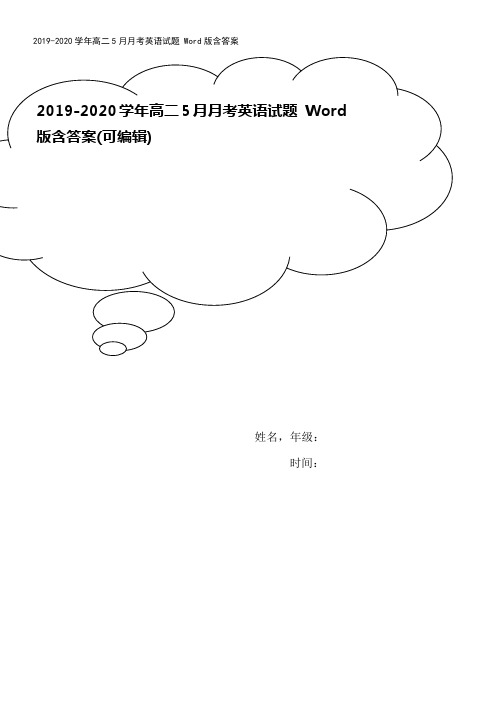
姓名,年级:时间:高二英语月考第一部分:听力(共两节,满分30分)第一节(共5小题;每小题1。
5分,满分7。
5分)听下面5段对话。
每段对话后有一个小题,从题中所给的A、B、C三个选项中选出最佳选项。
听完每段对话后,你都有10秒钟的时间来回答有关小题和阅读下一小题.每段对话仅读一遍. 1.Where does the conversation take place?A。
In a shop. B。
In a restaurant. C.In a supermarket。
2.How did the man spend his free time with his friends?A。
They played sports. B.They watched TV programs。
C.They played computer games。
3。
What does the man think of the seats on the plane?A.Wide. B。
Comfortable. C。
Small。
4.What are the speakers mainly talking about?A。
The whales。
B。
The weather. C. A voyage.5.When was Tim born?A.On February 24。
B。
On February 28。
C.On February 29.第二节(共15小题;每小题1。
5分,满分22。
5分)听下面5段对话或独白。
每段对话或独白后有几个小题,从题中所给的A、B、C三个选项中选出最佳选项,并标在试卷的相应位置。
听每段对话或独白前,你将有时间阅读各个小题,每小题5秒钟;听完后,各小题将给出5秒钟的作答时间。
每段对话或独白读两遍。
听第6段材料,回答第6、7题.6。
Why does the woman look tired?A。
She didn't sleep well。
湖北省黄石市大冶第一中学2020年高二英语月考试题含部分解析

湖北省黄石市大冶第一中学2020年高二英语月考试题含解析一、选择题1. The cab driver suddenly his cab almost at the same time he saw a dog rushing into the street.A.increased;soB.accelerated;butC.added;andD.produced;or参考答案:B提示:从suddenly和he saw a dog rushing into the street看出“出租车司机突然提速,但是,几乎就在这时……”,第一空白处应该填入表示“加速”的词。
increase“提高”;accelerate“加速”;add “添加”;produce“生产”。
只有accelerate能够接cab,bus,car等交通工具。
前一分句与后一分句有转折关系,因此,第二个空白处填入but。
32. How I wish I _____ to my parents' advice!A. listeningB. listenC. am listeningD. had listened参考答案:D3. These oranges look a little dry, but some orange juice may be able to be ____.A. picked outB. squeezed outC. given outD. left out参考答案:B4. He ________ have gone home, for his bag is still on the desk.A.wouldn't B.can't C.shouldn't D.needn't参考答案:B5. —Why didn't Sarah attend the meeting yesterday?—I have no idea.She_______the wrong time for the meeting.A. must have gotB. might have gotC. should getD. would get 参考答案:B考查情态动词的完成式。
2019—2020学年度高二英语下学期月考试题(含答案)

2019~2020学年度高二英语下学期月考试题第一部分阅读理解 (共两节,满分40分)第一节(共15小题,每题2分,满分30分)阅读下列短文,从所给的四个选项(A,B,C和D)中,选出最佳选项。
AAre you afraid of moving up to senior high school? It is a completely new experience, but you shouldn’t worry. We’ve got a guide to help you.You’re not alone.Remember that everybody else in your year is in the same boat. You may not notice it, but they’re just as nervous as you are.Moving to senior high school is a chance, not a problem. Things are different, and all you need to do is be polite and learn the new rules.The teachers will help.If you don’t know what to do or are worried about something, then ask for help. Teachers are probably the best people to turn to, because they have experience in helping new students. Pay attention to what your teachers say.Everything changes.There are lots of differences between junior high school and senior high school. You will have your lessons with different teachers in different rooms. You will have homework for different subjects on different days, so make sure you get organized.Other points.Make sure you know which rooms your classes are in and which days you have your different subjects on.If you’ve got an older brother or sister at the school, then ask them for advice. Be yourself! It sounds simple, but things will become better if you just act naturally.Having early nights makes a difference. You’ll also find it easier to get up in the morning!21. The author says that you’re not alone, because other students ______.A. are polite and friendlyB. will help you if possibleC. feel the same as you doD. will learn the new rules with you22. What does the writer think of moving up to senior high school?A. It is a difficult problem.B. It’s a good chance.C. It sounds simple.D. It’s worrying.23. Which of the following does the writer suggest you do?A. Just act naturally.B. Don’t be shy.C. Change yourself.D. Pay attention to others.24. The main purpose of the passage is to ______.A. tell students about a new experienceB. help students that are going to senior high schoolC. tell students how to make full use of timeD. teach students how to organize themselvesBAccording to some researchers, you should not praise children for everything that they do. It does not help them build self-confidence(自信).Most parents and teachers agree that praise can help increase children’s self-confidence —the more, the better. However, according to some researchers, only proper praise is good for children. If adults praise everything children do, it makes children look for praise all the time, not trying to do their best. "Teachers should not say things like ‘good job’ or ‘nice work’ whenever a child does anything. They should encourage them to continue to improve," some researchers advise.Another idea is that children with high self-confidence are happier, and do better at school. About this, Marshall Duke, a researcher in children, says, "High self-confidence brought in by too much praise does not make children happier, get more, or become able to do more. Finding a child’s advantages and developing them can help build confidence more than too much praise can." Praise also loses its effect if it is given equally to all students."It’s important to tell children the truth about what they’ve done. Honest feedback(反馈) is far better than empty praise," Duke adds. "People have got into the habit of not telling children when they’re wrong. That makes it hard for them to deal with difficultie s when they grow up. That’s just how the world is."25. According to some researchers, if parents praise their children too much, their children will ______.A. always look for praiseB. increase self-confidenceC. become strongD. do better in their studies26. In order to help children build self-confidence, some researchers advise parents to ______.A. make them live more happilyB. let them do more difficult workC. help them do better in schoolD. encourage them to improve27. Which of the following is TRUE, according to the passage?A. Praise makes children become successful.B. Children don’t know what they’re really good at.C. The same praise for all children has no meaning.D. Duke thinks praise is more important than fin ding children’s strengths.28. The underlined word "it" in the third paragraph refers to _________.A. the effectB. the praiseC. the advantageD.the confidenceCHi! Have you ever suddenly felt that someone you knew was in trouble — and was he? Have you ever dreamed something that came true later? Maybe you have ESP(超感觉知觉).ESP stands for Extrasensory Perception. It may be called a sixth sense. It seems to let people know about events before they happen, or events that are happening some distance away.Here's an example. A woman was ironing clothes. Suddenly she screamed, "My father isdead! I saw him sitting in the chair!" Just then, a telegram came. The woman's father died of a heart attack. He died sitting in a chair.There are thousands of stories like this one on record. Scientists are studying them to find out what's behind these strange mental messages. Here's another example—one of hundreds of dreams that have come true.A man dreamed he was walking along a road when a horse and carriage came by. The driver said, "There's room for one more." The man felt the driver seemed dead, so he ran away. The next day, when the ma n was getting on a crowded bus, the bus driver said, "There's room for one more."Then the man saw that the driver's face was the same face he had seen in the dream. He wouldn't get on the bus. As the bus drove off, it crashed and burst into flames. Everyone was killed!Some people say stories like these are coincidences(巧合). Others, including some scientists, say that ESP is real. From studies of ESP, we may someday learn more about the human mind.29.According to the passage, the writer believes that the sixth sense is ________. A. in existence B. imaginative C. not real D. impossible30.ESP lets people know _________.A. about events before they happenB. about events after they happenC. about events that are happening some distance awayD. A and C31.By studying ESP, scientists may get to ________.A. learn how people tell liesB. know more about human dreamsC. know more about human mindD. learn how strange things happenDIt is interesting that the arrival of snow has the effect on people in different countries. For some countries it is an important happening to celebrate each year, while for others a disaster or even a wonder.But there are countries between these two kinds that normally expect snow some time over the winter months, but never receive snow regularly or in the same quantities every year. Britain is one of them, for which the arrival of snow quite simply creates problems. Within hours of the first snowfalls, however trains and buses have to stop in the middle of the way. Telephone calls become difficult and the post immediately takes more time than usual. And almost within hours there are also certain shortages — bread, vegetables and other things — not because all these things can no longer be produced or sent to shops, but mainly because people are frightened and go out and store up with food and so on —“just for fear that something bad should happen”.But why does snow have this effect? It is simply because there is not enough planning and preparation. We need money to buy equipment to deal with snow and ice. To keep the roads clear, for example, requires snow-ploughs(犁雪车) and machines to spread salt. The reason why a country like Britain does not buy snow-ploughs is that they are only used for a few days in any one year, and the money could be more useful in other things such as hospitals, education, helping the old and so on.32. According to the writer, Britain is a country .A. which has regular snowB. which is not well prepared for snowC. for which snow is a disasterD. for which snow is a wonder33. After a few hours’ snow there is often some shortage of food because .A. shops have closed downB. people buy as much as they canC. farmers cannot produce any moreD. people eat more vegetables in winter34. The first reason why the British do not buy snow-ploughs is that .A. spreading salt is good enoughB. old people need more moneyC. snow-ploughs are not used oftenD. the hospital is more important35.The underlined words “two kinds” mean the countries .A. which have snow either as yearly happening to celebrate or as rare weatherB. which either have heavy snow or light snowC. to which snow either causes problems or no problemsD. which either have snow-ploughs or no snow-ploughs第二节(共5小题,每小题2分,满分10分)根据短文内容,从短文后的选项中选出能填入空白处的最佳选项。
湖北省2019-2020学年高二下学期期中考试英语试卷含答案
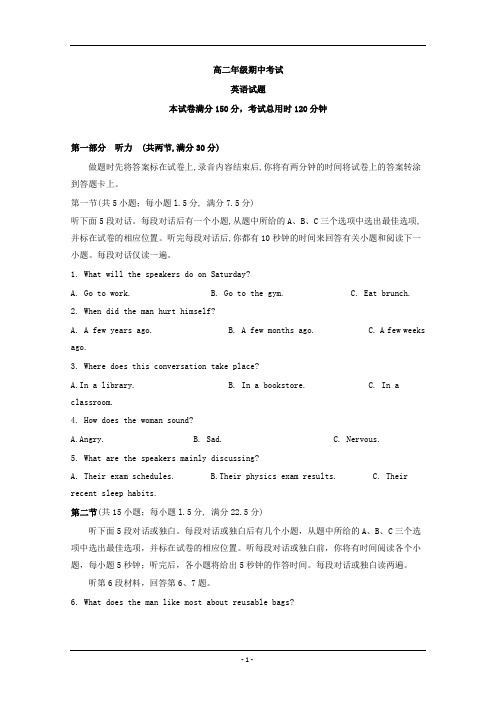
高二年级期中考试英语试题本试卷满分150分,考试总用时120分钟第一部分听力 (共两节,满分30分)做题时先将答案标在试卷上,录音内容结束后,你将有两分钟的时间将试卷上的答案转涂到答题卡上。
第一节(共5小题;每小题l.5分, 满分7.5分)听下面5段对话。
每段对话后有一个小题,从题中所给的A、B、C三个选项中选出最佳选项,并标在试卷的相应位置。
听完每段对话后,你都有10秒钟的时间来回答有关小题和阅读下一小题。
每段对话仅读一遍。
1. What will the speakers do on Saturday?A. Go to work.B. Go to the gym.C. Eat brunch.2. When did the man hurt himself?A. A few years ago.B. A few months ago.C. A few weeks ago.3. Where does this conversation take place?A.In a library.B. In a bookstore.C. In a classroom.4. How does the woman sound?A.Angry.B. Sad.C. Nervous.5. What are the speakers mainly discussing?A. Their exam schedules.B.Their physics exam results.C. Their recent sleep habits.第二节(共15小题;每小题l.5分, 满分22.5分)听下面5段对话或独白。
每段对话或独白后有几个小题,从题中所给的A、B、C三个选项中选出最佳选项,并标在试卷的相应位置。
听每段对话或独白前,你将有时间阅读各个小题,每小题5秒钟;听完后,各小题将给出5秒钟的作答时间。
每段对话或独白读两遍。
听第6段材料,回答第6、7题。
2019-2020年高二下学期期中英语试卷(附答案)
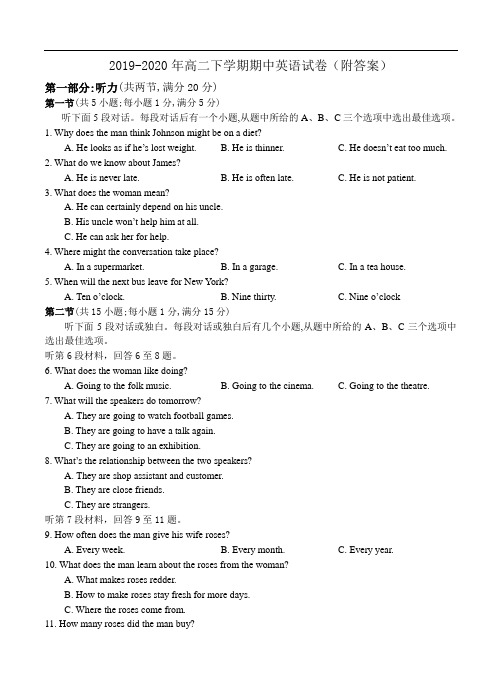
2019-2020年高二下学期期中英语试卷(附答案)第一部分:听力(共两节,满分20分)第一节(共5小题;每小题1分,满分5分)听下面5段对话。
每段对话后有一个小题,从题中所给的A、B、C三个选项中选出最佳选项。
1. Why does the man think Johnson might be on a diet?A. He looks as if he’s lost weight.B. He is thinner.C. He doesn’t eat too much.2. What do we know about James?A. He is never late.B. He is often late.C. He is not patient.3. What does the woman mean?A. He can certainly depend on his uncle.B. His uncle won’t help him at all.C. He can ask her for help.4. Where might the conversation take place?A. In a supermarket.B. In a garage.C. In a tea house.5. When will the next bus leave for New York?A. Ten o’clock.B. Nine thirty.C. Nine o’clock第二节(共15小题;每小题1分,满分15分)听下面5段对话或独白。
每段对话或独白后有几个小题,从题中所给的A、B、C三个选项中选出最佳选项。
听第6段材料,回答6至8题。
6. What does the woman like doing?A. Going to the folk music.B. Going to the cinema.C. Going to the theatre.7. What will the speakers do tomorrow?A. They are going to watch football games.B. They are going to have a talk again.C. They are going to an exhibition.8. What’s the relationship between the two speakers?A. They are shop assistant and customer.B. They are close friends.C. They are strangers.听第7段材料,回答9至11题。
湖北省大冶市第一中学2019_2020学年高二英语下学期期中(5月月考)试题
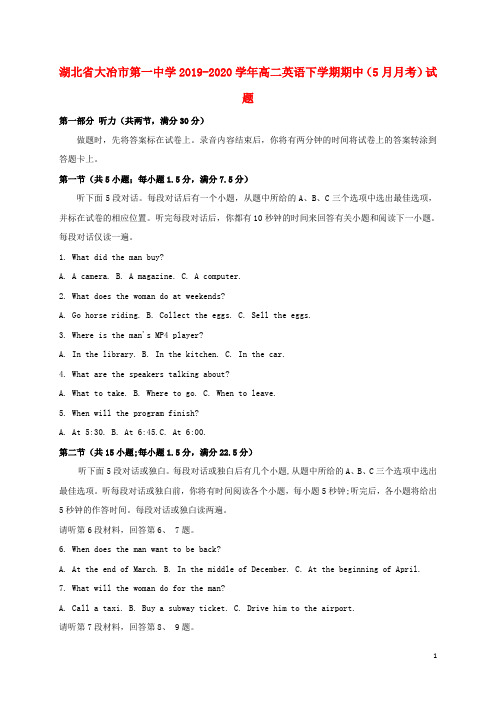
湖北省大冶市第一中学2019-2020学年高二英语下学期期中(5月月考)试题第一部分听力(共两节,满分30分)做题时,先将答案标在试卷上。
录音内容结束后,你将有两分钟的时间将试卷上的答案转涂到答题卡上。
第一节(共5小题;每小题1.5分,满分7.5分)听下面5段对话。
每段对话后有一个小题,从题中所给的A、B、C三个选项中选出最佳选项,并标在试卷的相应位置。
听完每段对话后,你都有10秒钟的时间来回答有关小题和阅读下一小题。
每段对话仅读一遍。
1. What did the man buy?A. A camera.B. A magazine.C. A computer.2. What does the woman do at weekends?A. Go horse riding.B. Collect the eggs.C. Sell the eggs.3. Where is the man's MP4 player?A. In the library.B. In the kitchen.C. In the car.4. What are the speakers talking about?A. What to take.B. Where to go.C. When to leave.5. When will the program finish?A. At 5:30.B. At 6:45.C. At 6:00.第二节(共15小题;每小题1.5分,满分22.5分)听下面5段对话或独白。
每段对话或独白后有几个小题,从题中所给的A、B、C三个选项中选出最佳选项。
听每段对话或独白前,你将有时间阅读各个小题,每小题5秒钟;听完后,各小题将给出5秒钟的作答时间。
每段对话或独白读两遍。
请听第6段材料,回答第6、 7题。
6. When does the man want to be back?A. At the end of March.B. In the middle of December.C. At the beginning of April.7. What will the woman do for the man?A. Call a taxi.B. Buy a subway ticket.C. Drive him to the airport.请听第7段材料,回答第8、 9题。
2019-2020年高二下学期期中英语试卷(附答案)

2019-2020年高二下学期期中英语试卷(附答案)第一部分:听力(共两节,满分20分)第一节(共5小题;每小题1分,满分5分)听下面5段对话。
每段对话后有一个小题,从题中所给的A、B、C三个选项中选出最佳选项。
1. Why does the man think Johnson might be on a diet?A. He looks as if he’s lost weight.B. He is thinner.C. He doesn’t eat too much.2. What do we know about James?A. He is never late.B. He is often late.C. He is not patient.3. What does the woman mean?A. He can certainly depend on his uncle.B. His uncle won’t help him at all.C. He can ask her for help.4. Where might the conversation take place?A. In a supermarket.B. In a garage.C. In a tea house.5. When will the next bus leave for New York?A. Ten o’clock.B. Nine thirty.C. Nine o’clock第二节(共15小题;每小题1分,满分15分)听下面5段对话或独白。
每段对话或独白后有几个小题,从题中所给的A、B、C三个选项中选出最佳选项。
听第6段材料,回答6至8题。
6. What does the woman like doing?A. Going to the folk music.B. Going to the cinema.C. Going to the theatre.7. What will the speakers do tomorrow?A. They are going to watch football games.B. They are going to have a talk again.C. They are going to an exhibition.8. What’s the relationship between the two speakers?A. They are shop assistant and customer.B. They are close friends.C. They are strangers.听第7段材料,回答9至11题。
湖北省大冶市第一中学2019-2020学年高二英语下学期期中(5月月考)试题
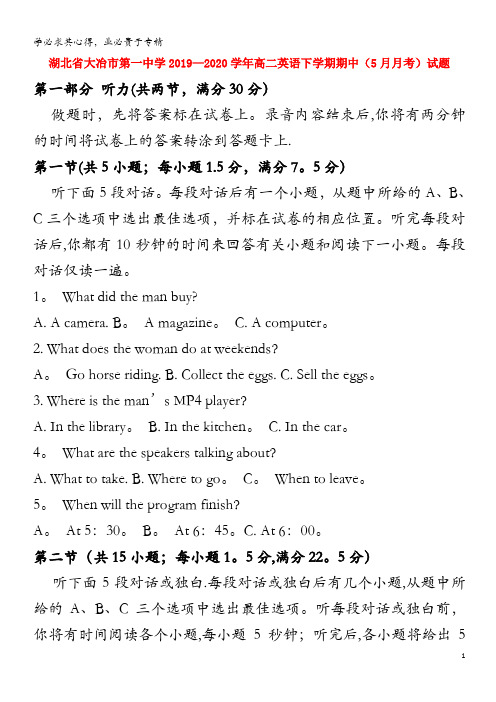
湖北省大冶市第一中学2019—2020学年高二英语下学期期中(5月月考)试题第一部分听力(共两节,满分30分)做题时,先将答案标在试卷上。
录音内容结束后,你将有两分钟的时间将试卷上的答案转涂到答题卡上.第一节(共5小题;每小题1.5分,满分7。
5分)听下面5段对话。
每段对话后有一个小题,从题中所给的A、B、C三个选项中选出最佳选项,并标在试卷的相应位置。
听完每段对话后,你都有10秒钟的时间来回答有关小题和阅读下一小题。
每段对话仅读一遍。
1。
What did the man buy?A. A camera. B。
A magazine。
C. A computer。
2. What does the woman do at weekends?A。
Go horse riding. B. Collect the eggs. C. Sell the eggs。
3. Where is the man’s MP4 player?A. In the library。
B. In the kitchen。
C. In the car。
4。
What are the speakers talking about?A. What to take.B. Where to go。
C。
When to leave。
5。
When will the program finish?A。
At 5:30。
B。
At 6:45。
C. At 6:00。
第二节(共15小题;每小题1。
5分,满分22。
5分)听下面5段对话或独白.每段对话或独白后有几个小题,从题中所给的A、B、C三个选项中选出最佳选项。
听每段对话或独白前,你将有时间阅读各个小题,每小题5秒钟;听完后,各小题将给出5秒钟的作答时间.每段对话或独白读两遍。
请听第6段材料,回答第6、7题。
6。
When does the man want to be back?A。
At the end of March。
湖北省黄石市大冶镇中学高二英语月考试题含部分解析
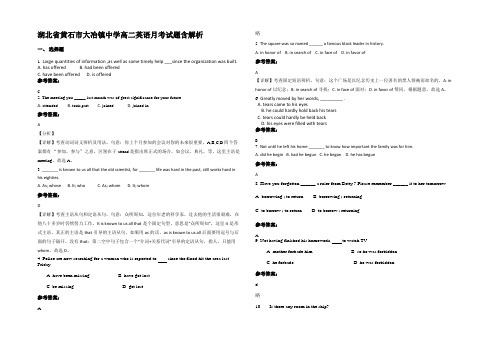
湖北省黄石市大冶镇中学高二英语月考试题含解析一、选择题1. Large quantities of information ,as well as some timely help ___since the organization was built.A. has offeredB. had been offeredC. have been offeredD. is offered参考答案:C2. The meeting you _____ last month was of great significance for your future.A. attendedB. took partC. joinedD. joined in参考答案:A【分析】【详解】考查动词词义辨析及用法。
句意:你上个月参加的会议对你的未来很重要。
A,B,C,D四个答案都有“参加,参与”之意,区别在于attend是指出席正式的场合,如会议,典礼,等,这里主语是meeting,故选A。
3. _______ is known to us all that the old scientist, for _______ life was hard in the past, still works hard in his eighties.A. As; whoseB. It; whoC. As; whomD. It; whom参考答案:D【详解】考查主语从句和定语从句。
句意:众所周知,这位年老的科学家,过去他的生活很艰难,在他八十多岁时仍然努力工作。
It is known to us all that是个固定句型,意思是“众所周知”,这里it是形式主语,真正的主语是that引导的主语从句,如果用as的话,as is known to us all后面要用逗号与后面的句子隔开,没有that;第二空中句子包含一个“介词+关系代词”引导的定语从句,指人,只能用whom,故选D。
- 1、下载文档前请自行甄别文档内容的完整性,平台不提供额外的编辑、内容补充、找答案等附加服务。
- 2、"仅部分预览"的文档,不可在线预览部分如存在完整性等问题,可反馈申请退款(可完整预览的文档不适用该条件!)。
- 3、如文档侵犯您的权益,请联系客服反馈,我们会尽快为您处理(人工客服工作时间:9:00-18:30)。
2020年夏季大冶一中期中联考高二试卷第一部分听力(共两节,满分30分)做题时,先将答案标在试卷上。
录音内容结束后,你将有两分钟的时间将试卷上的答案转涂到答题卡上。
第一节(共5小题;每小题1.5分,满分7.5分)听下面5段对话。
每段对话后有一个小题,从题中所给的A、B、C三个选项中选出最佳选项,并标在试卷的相应位置。
听完每段对话后,你都有10秒钟的时间来回答有关小题和阅读下一小题。
每段对话仅读一遍。
1. What did the man buy?A. A camera.B. A magazine.C. A computer.2. What does the woman do at weekends?A. Go horse riding.B. Collect the eggs.C. Sell the eggs.3. Where is the man's MP4 player?A. In the library.B. In the kitchen.C. In the car.4. What are the speakers talking about?A. What to take.B. Where to go.C. When to leave.5. When will the program finish?A. At 5:30.B. At 6:45.C. At 6:00.第二节(共15小题;每小题1.5分,满分22.5分)听下面5段对话或独白。
每段对话或独白后有几个小题,从题中所给的A、B、C三个选项中选出最佳选项。
听每段对话或独白前,你将有时间阅读各个小题,每小题5秒钟;听完后,各小题将给出5秒钟的作答时间。
每段对话或独白读两遍。
请听第6段材料,回答第6、 7题。
6. When does the man want to be back?A. At the end of March.B. In the middle of December.C. At the beginning of April.7. What will the woman do for the man?A. Call a taxi.B. Buy a subway ticket.C. Drive him to the airport.请听第7段材料,回答第8、 9题。
8. How many times does the woman probably practice this week?A. Four times.B. Three times.C. Twice.9. What does the woman plan to do this Sunday?A. Attend a competition.B. Sign up for a race.C. Have a rest.请听第8段材料,回答第10至12题。
10. How did the woman feel when she was at the summer camp?A. Homesick.B. Enjoyable.C. Lonely.11. What sport could the woman do before the summer camp?A. Swimming.B. Volleyball.C. Tennis.12. What did the man enjoy doing at the summer camp?A. Singing.B. Playing the guitar.C. Playing the piano.请听第9段材料,回答第13至16题。
13. What won't the man pick up?A. A birthday cake.B. Some balloons.C. Some candles.14. Where will the man go first?A. Children's Café.B. The supermarket.C. The grocery store.15. What will the man do at the party?A. Collect the gifts.B. Play games with kids.C. Give the kids some toys.16. What does the woman mean at the end of the conversation?A. It's hard to organize a party.B. It will be a mess after the party.C. It will be noisy during the party.请听第10段材料,回答第17至20题。
17. Where can people consult the dictionary?A. On the right of the librarian's desk.B. On the left of the librarian's desk.C. Opposite the librarian's desk.18. What is just beyond the librarian's desk?A. The journal area.B. The study area.C. The main library area.19.What is going to be introduced later?A. Storybooks.B. History books.C. Guidebooks.20. Which collection is not in this building?A. The video collection.B. The collection of picture books.C. The art collection.第二部分阅读理解(共两节,满分35分)第一节(共10小题;每小题2.5分,满分25分)阅读下列短文,从每题所给的四个选项(A、B、C和D)中,选出最佳选项,并在答题卡上将该项涂黑。
AA month after Hurricane Katrina, I returned home in New Orleans. There lay my house, reduced to waist-high rains, smelly and dirty.Before the trip, I’d had my car fixed. When the office employee of the garage was writing up the bill, she noticed my Louisiana license plate. “You from New Orleans?” she asked.I said I was, “No charge.” She said, and firmly shook her head when I reached for my wallet. The next day I went for a haircut, and the same thing happened.As my wife was studying in Florida, we decided to move there and tried to find a rental house that we could afford while also paying off a mortgage(抵押贷款) on our ruined house. We looked at many places, but none was satisfactory. We’d began to accept that we’d have to live in extremely reduced circumstances for a while, when I got a very curious e-mail from a James Kemmedy in California. He’d read some pieces I’d written about our sufferings for state, the online magazine and wanted to give us (“no conditions attached”) a new house across the lake from New Orleans. It sounded a good to her return, but I replied, thinking him for his exceptional generosity, then we to go back. Then the University of Florida offered to let him house to me. While he want to England on his one year, paid leave. The rent was rather reasonable. I mentioned the poet’s offer to James Kemdedy, and the next day he sent a check covering our entire rent for eight months.Throughout this painful experience, the kindness of strangers has done much to bring back my faith in humanity. It’s almost worth losing you wordy possessions to be reminded that people really when given had a channel.21. What do we know about James Kemnedy?A. He was a writer of an online magazineB. He offered the author a new house free of charge.C. He was a poet at the University of Florida.D. He learned about the author’s sufferings.22. It can be inferred from the text that .A. houses were difficult to find in the hurricane stricken areaB. rents were comparatively reasonable despite the disasterC. the author’s family was in financial difficultyD. the mortgage on the ruined house was paid off by the bank23. Which would be the best title for the text?A. Terrible Hurricane Katrina but comfortable life on our own.B. The Importance of Helping Others in reward.C. Life and study free of rent in Florida,feeling grateful.D. Hurricane Is Heartless While Strangers Are Kind.BIn recent decades, countries around the world have made great progress against malaria. However, a new report from the World Health Organization (WHO) says that progress is at risk.This WHO annual report looks at the global fight against the disease. It says that malaria cases are on the rise in several countries.Many countries are moving toward eliminating malaria, among them Madagascar, Senegal and Zimbabwe.However, the WHO report warns that in others, progress has stalled.Malaria cases increased by more than 20 percent from 2015 to 2016 in eight African countries - including Rwanda, Nigeria and the Democratic Republic of Congo.At the same time, funding for malaria prevention and treatment has leveled off,reaching $2.7 billion in 2016. This amount is less than half of the 2020 target.Professor David Conway is from the London School of Hygiene and Tropical Medicine. He says money for fighting malaria has plateaued, meaning it has not increased in a long time.Overall, Africa continues to suffer the most from malaria. In 2016, just over 400,000 people died from the disease. This is slightly less than in 2015. However, in Africa the malaria parasite does not yet appear to be developing drug resistance.The same cannot be said for Southeast Asia.Conway explains that there are renewed concerns that in Southeast Asia malaria will become drug-resistant in the future.The WHO is calling for improving the coverage of existing methods of malaria prevention as well as an urgent investment in new tools -- namely a malaria vaccine.Professor Conway said, "More research is needed to develop an effective malaria vaccine that could cover the populations that at the moment have high malaria rates and that perhaps don't use the available interventions even when they are being funded."Several malaria vaccines are under development. Starting in 2018, the WHO is planning a major trial of the RTSS vaccine in Kenya, Ghana and Malawi.But this latest report from the WHO warns that the world is at a crossroads. Without better funding and more effective tools to fight malaria, the progress made in recent decades could be undone.24.Which of the following statements is not true?A. A bit more than 400,000 people died from malaria in African countries.B. More and more money has been put in malaria prevention and treatment.C. Fewer and fewer people are suffering from malaria in the past decade.D. Malaria cases decreased less than 20 percent in eight African countries in 2016.25. What does the word “they” in Paragraph 3 from the bottom mean?A. malariaB. the available interventionsC. the populationsD. malaria rates26. Why does the WHO show the worry about the battle of anti-malaria nowadays?A. Progress of fighting malaria is greatly short of money and effective toolsB. More and more people cannot get treatment for malaria in time.C. No countries are likely to have got funding and effective tools from the WHO.D. Some malaria sufferers in Africa have refused to get treatments from the WHO.CThe effect of artificial intelligence (AI) will be felt across various industries, and advertising is no different. From programmatic buying to e-commerce, AI is already changing how brands connect with consumers. The real future of AI in advertising will rely on people working together to create experiences which bring real value to consumers.“Brands don't just exist because of what they say but because of what they do. They must create new customer interactions (互动),” says Ogilvy Consulting Senior Partner Pierre Robinet.“These interactions have to be useful, sharable and per sonal, providing an essential service at the right moment and in the right place.”It is predicted that by 2020, 85 per cent of customer interactions will be managed without the need for a human being. This presents a fantastic opportunity to rethink customer strategy (策略). How do we connect with an AI-empowered customer who speaks more than he writes, who uses his face and fingers to interact with his devices, who prizes a hassle-free experience?“AI is going to influence the revenue (收益) structure of any company,”says Robinet.“Sellers are always trying to be more exact in predicting which product you want to get from their platform. Amazon is already moving goods into their warehouses (仓库) based entirely on predictive demand, moving the model from‘shopping then delivery' to‘delivery then shopping.” We We are presently in an exciting period of experimentation, where brands and marketers are exploring the different possibilities and applications of AI. Decision-makers now must figure out how AI can influence business models and be a driver of growth.In order to overcome fear and mistrust of issues like the mishandling of data, Robinet believes that each and every consumer should be equipped to understand these technologies so they can make a wise decision.“On one side, we need more fairness and ethics (道德标准) in AI, as well as specific frameworks and rules to do so,”he says.“While on the other, we need to give people the right tools, services and education, and motivate them to share their data.”27. What is the author's attitude towards using AI in advertising?A. Cautious.B. Favourable.C. Doubtful.D. Worried.28. What does the underlined word“hassle-free”in Paragraph 3 m ost probably mean?A. Real-life.B. First-hand.C. Convenient.D. Professional.29. Why is Amazon mentioned in Paragraph 4?A. To show AI can help entirely reshape business models.B. To explain sellers always know customers better.C. To prove consumers are likely to interact with machines.D. To show AI can free people from tough jobs.30. What can we infer from the last paragraph?A. People's fear of AI is increasing.B.AI can help people make decisions.C. More and more people are unwilling to share their data.D. People must know AI well before they accept it.第二节(共5小题;每小题2分,满分10分)根据短文内容,从短文后的选项中选出能填入空白处的最佳选项。
